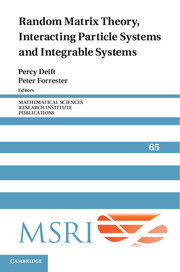Book contents
- Frontmatter
- Contents
- Preface
- Universality conjecture for all Airy, sine and Bessel kernels in the complex plane
- On a relationship between high rank cases and rank one cases of Hermitian random matrix models with external
- Riemann–Hilbert approach to the six-vertex model
- CLT for spectra of submatrices of Wigner random matrices, II: Stochastic evolution
- Critical asymptotic behavior for the Korteweg–de Vries equation and in random matrix theory
- On the asymptotics of a Toeplitz determinant with singularities
- Asymptotic analysis of the two-matrix model with a quartic potential
- Conservation laws of random matrix theory
- Asymptotics of spacing distributions 50 years later
- Applications of random matrix theory for sensor array imaging with measurement noise
- Convolution symmetries of integrable hierarchies, matrix models and τ-functions
- Universality limits via “old style” analysis
- Fluctuations and large deviations of some perturbed random matrices
- Three lectures on free probability
- Whittaker functions and relatedstochastic processes
- How long does it take to compute the eigenvalues of a random symmetric matrix?
- Exact solutions of the Kardar–Parisi–Zhang equation and weak universality for directed random polymers
- Replica analysis of the one-dimensional KPZ equation
- Asymptotic expansions for β matrix models and their applications to the universality conjecture
- KPZ scaling theory and the semidiscrete directed polymer model
- Experimental Realization Of Tracy–Widom Distributions And Beyond: Kpz Interfaces In Turbulent Liquid Crystal
- Random matrices: the four-moment theorem for Wigner ensembles
Universality limits via “old style” analysis
Published online by Cambridge University Press: 29 May 2025
- Frontmatter
- Contents
- Preface
- Universality conjecture for all Airy, sine and Bessel kernels in the complex plane
- On a relationship between high rank cases and rank one cases of Hermitian random matrix models with external
- Riemann–Hilbert approach to the six-vertex model
- CLT for spectra of submatrices of Wigner random matrices, II: Stochastic evolution
- Critical asymptotic behavior for the Korteweg–de Vries equation and in random matrix theory
- On the asymptotics of a Toeplitz determinant with singularities
- Asymptotic analysis of the two-matrix model with a quartic potential
- Conservation laws of random matrix theory
- Asymptotics of spacing distributions 50 years later
- Applications of random matrix theory for sensor array imaging with measurement noise
- Convolution symmetries of integrable hierarchies, matrix models and τ-functions
- Universality limits via “old style” analysis
- Fluctuations and large deviations of some perturbed random matrices
- Three lectures on free probability
- Whittaker functions and relatedstochastic processes
- How long does it take to compute the eigenvalues of a random symmetric matrix?
- Exact solutions of the Kardar–Parisi–Zhang equation and weak universality for directed random polymers
- Replica analysis of the one-dimensional KPZ equation
- Asymptotic expansions for β matrix models and their applications to the universality conjecture
- KPZ scaling theory and the semidiscrete directed polymer model
- Experimental Realization Of Tracy–Widom Distributions And Beyond: Kpz Interfaces In Turbulent Liquid Crystal
- Random matrices: the four-moment theorem for Wigner ensembles
Summary
Techniques from “old style” orthogonal polynomials have turned out to be useful in establishing universality limits for fairly general measures. We survey some of these.
1. Introduction
We focus on the classical setting of random Hermitian matrices: consider a probability distribution P(n) on the space of n by n Hermitian matrices M = (mij)1≤i,j≤n:
Here w is some nonnegative function defined on Hermitian matrices, and c is a normalizing constant. The most important case is
for appropriate functions Q. In particular, the choice (Q(M) =M2, leads to the Gaussian unitary ensemble (apart from scaling) that was considered by Wigner, in the context of scattering theory for heavy nuclei. When expressed in spectral form, that is as a probability density function on the eigenvalues x1≤x2≤...≤xn of M, it takes the form
See [Deift 1999, p. 102 ff.]. Again, c is a normalizing constant. Note that w now can be any nonnegative measurable function.
Information
- Type
- Chapter
- Information
- Publisher: Cambridge University PressPrint publication year: 2014
